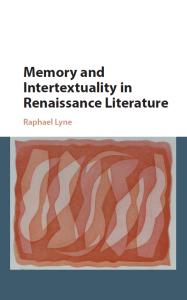Memory and Intertextuality in Renaissance Literature (Cambridge, 2016). By: Me.
For the last ten years I’ve been working on two main projects. One is an edition of Shakespeare’s Poems that should come out later this year; on that one I’ve been collaborating with Cathy Shrank, who teaches at the University of Sheffield. The other is this book, just out with Cambridge University Press. One thing I’ve realised is that it’s probably better to do one project for the first five years, and then the second project for the next five years. On the other hand, I have also come to think that things come to fruition when they’re ready. I’ve used this blog to announce new publications before and this one’s a big deal for me. Unfortunately I have my usual paranoia about the thought of anyone reading it; I hope that passes. I am enjoying looking at the cover, though: the combination of a picture in my College’s art collection (by Helaine Blumenfeld; it was very kind of her to let me use it), and a sharp design from C.U.P.
This book is my longest effort (so far) to argue that literature knows something about your brain. I use some ideas from cognitive science to set up some new ways of thinking about how poems remember one another, but I keep coming back to the idea that the poems and plays are themselves essays and experiments on the subject of memory.

Not long ago we had a ‘Strategic Research Review’ in my Faculty: this is a visitation by wise heads in the subject, advising us how to make the most of our research time. One of the questions threw me off balance a bit: they asked how I saw my work fitting into (or not) an idea of ‘Cambridge English’. My first thought was, well, although I know that the subject has an illustrious history at my University, I don’t walk around thinking ‘OK everyone, here’s Cambridge, shedding the light!’. Really not. But I had to acknowledge that one of the things Cambridge is known for, close reading (or just reading closely), is something I do a lot, and which I think is important. My new book includes a lot of close reading, perhaps off-puttingly much, I worry.
If you’ve read previous posts on this blog you’ve probably seem some pretty lengthy bits of detailed analysis here too. The detail’s important: it’s in the nuances that elusive qualities of our minds can catch the light. The length is important as well. I think that what literature knows about the way we think comes through in processes, not outcomes. It’s not something I feel I can often pin down in a couple of extracted lines. It comes to life as it unfolds over time, and time is a dimension of thought that literature is well equipped to explore.
Congratulations on the new book, Raphael!!